EBICS REU Students Experience Research on Biological Machines
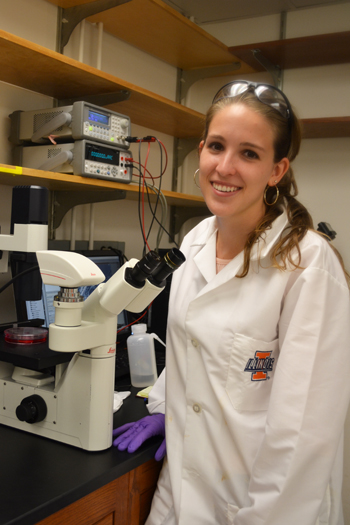
EBICS REU participant Morgan Elliott at work in the Kong Lab.
August 29, 2013
Not too long ago, the five undergrad students who spent the summer in Illinois labs could only have encountered biological machines in one place—straight out of Sci-Fi. But as part of EBICS' (Emergent Behavior of Integrated Cellular Systems) Research Experience for Undergraduates (REU) program, these students got to conduct research in ground-breaking new areas like biological machines and biomedical engineering.
As part of the National Science Foundation's REU program, the undergrads participated in a 10-week research experience in the labs of Illinois researchers who are part of EBICS. Also an NSF-funded program, EBICS is dedicated to creating a new scientific discipline for building living, multi-cellular machines to solve real-world problems, such as in health.
In addition to experiencing unique, cutting-edge research, the participants report that participating in the REU helped answer some of the following crucial questions regarding their future educational and career choices: "Do I want to go to graduate school?" "If so, where should I go to school?" "Do I want to do research?"
Did the REU experience change REU participants' minds about going to graduate school? Ayesha Tillman, I-STEM Research Associate, who is helping to evaluate EBICS' REU program, doesn't think so, because she believes some were already considering grad school. "I think it helps inform their decision," she qualifies.
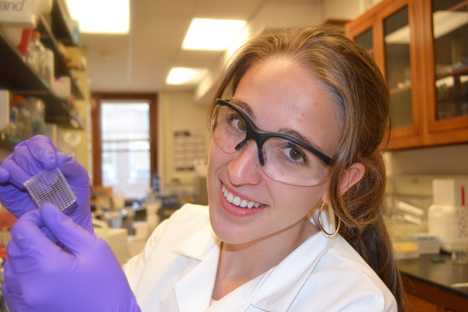
Elliot displays some of the work she did studying myogenisis of muscle tissue.
Such is the case for rising junior Morgan Elliott, who worked in the lab of Illinois researcher Hyunjoon Kong. Mentored by Eleni Antoniadou, Elliott conducted research involving the study of myogenesis (the formation of muscle tissue) through electrical stimulation.
Elliott, who is studying Biomedical Engineering at Saint Louis University, plans to get a Ph.D., then work in biomedical engineering in either academia or industry.
Why biomedical engineering? After volunteering in a children's hospital and seeing young children who've been in car accidents, Elliott wants to design tools that would help youngsters like them to rehabilitate. Thus, she decided on a career in the research and development of prosthetics.
How did Elliott end up at Illinois this summer, and is she considering Illinois for her Ph.D.? Elliott reports that her professor made a list of REU programs she should consider, and Illinois' EBICS REU was on it. As far as doing her Ph.D. here, "Of course I'm looking into U of I," she admits, "because it's a top engineering school..."
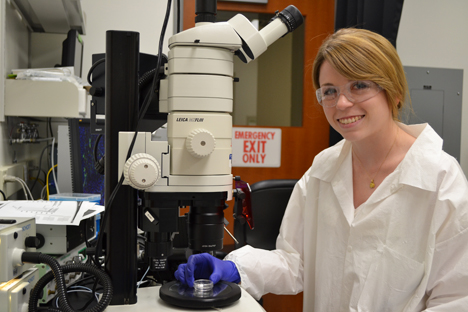
REU participant Madeline Tolish at work in Rashid Bashir's lab.
Another EBICS REU participant, rising junior Madeline Tolish, who is studying biomedical engineering at Vanderbilt University in Nashville, indicates that the REU experience helped with her decision-making. Torn between grad school and industry, she still hasn't decided: "I'm not really sure," but says, "This is definitely teaching me a lot, helping me with decisions."
Part of Rashid Bashir's research group, Tolish got to work with Bio-bots—3D biological machines. Of her experience with the EBICS REU, Tolish reports: "I've probably learned more in the past seven weeks than I have in two years in the classroom. Previously, I've done a little work in labs at Vanderbilt, but nothing even close to this extent."
As a result of her REU experience, Tolish is most likely going into research: "It's definitely helping me learn more about research and grad school to help me make a decision of what I want to do after I graduate. And that's making me realize I do like research a lot. It's definitely helping push me in that direction."
Is Tolish also considering Illinois? "Definitely," she reports. "I'm from the Chicago area. My dad went here; my brother went here. So I've loved this campus and been an Illini fan since I could walk. So I definitely would consider coming here. It's a great school."
According to I-STEM evaluator Tillman, in addition to helping students with their decision making, she believes participating in the REU program increases students' chances of being accepted by graduate schools. "It may not enhance their desire or their willingness to go," she qualifies, "but I think it gives them a better chance of going, because they have this research experience that they can put on their resume."
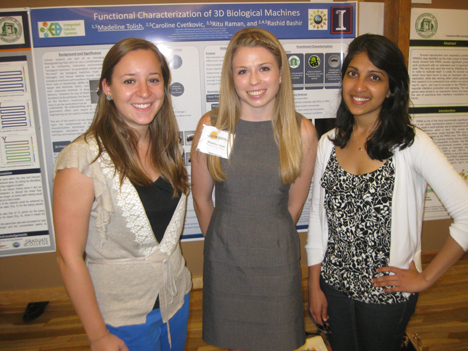
Clockwise from the left: Tolish's mentor, grad student Caroline Cvetkovic, Madeline Tolish, and grad student Ritu Raman pose in front of the poster Tolish made for the final poster presentation.
Regarding the effectiveness of EBICS' REU program this summer, Tillman reports that one really positive aspect was the graduate student mentors, who were really involved. One of Tolish's mentors, grad student Ritu Raman, indicated that Tolish worked hard and was able to contribute to the research:
"I was very impressed with Madeline's dedication and work ethic. She treated research like a full time job—which it is—and her hard work really payed off. Within just a few weeks, she was able to get a handle on a very complex research initiative and work on a project that added a brand new dimension to our research in biological machines."
In fact, Raman so enjoyed her experience as a mentor, that she hopes to do it again in the future. "I am very pleased with the EBICS REU program, in general, and think it did a great job matching motivated students with interesting research projects. I'm looking forward to being an REU mentor again in the coming years and hope to keep interacting with undergraduate students like Madeline!"
Another of Tolish's mentors, grad student Caroline Cvetkovic, indicates that being a REU mentor, while positive, was also a growing experience for her:
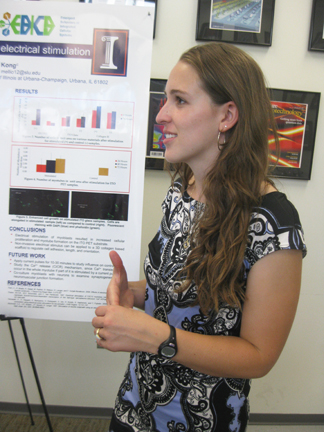
Morgan Elliott explains her research during the EBICS final poster presentation.
"It's been a challenge for me personally, but I think it's been really beneficial, because I've been learning a lot about how to approach something from a very systematic perspective. Because in research, very rarely is everything linear. Ideally, you would start from step one, and go from two, three, four, five…It's been difficult for both of us. She's learning a lot, obviously. The project she's doing, I've never done before, so we're both kind of learning as we go.
Tillman recognizes that adding undergrads to their lab mix short-term can be a negative for researchers:
"It can be a challenge," acknowledges Tillman, "because it can be disruptive to the lab to have an undergraduate come in. You have to teach them, and you have a graduate student spending time, and there's not necessarily a lot of productivity from the REU student."
Tillman says that researchers who take REU students should be commended, indicating that they are focusing not on short-term benefits, but on the long-term benefits for their field: "I think ahead of time they know, 'This may not directly help me in any way.' It's more like, 'I'm taking these because I feel like this is important to expose students to this type of work.'"
Story by Elizabeth Innes I-STEM Communications Specialist and Sneha Shruti, I-STEM Journalism Intern. Photos by Sneha Shruti, I-STEM Journalism Intern.
More: EBICS, Summer Research, Undergrad, REU, REU: EBICS, 2013
For additional I-STEM articles about 2013 REU participants at Illinois, see:
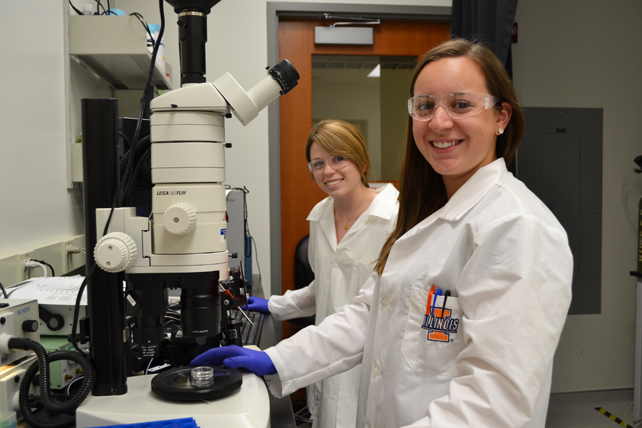
Left to right: Madeline Tolish and her mentor, grad student Caroline Cvetkovic at work in the lab of Illinois researcher Rashid Bashir.













.jpg)
















